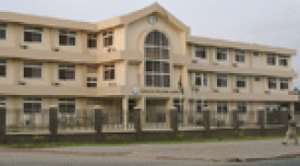
The Urology Unit of the Korle-Bu Teaching Hospital is under intense human resource and space pressure from the increasing number of patients seeking consultation and surgery.
Records at the unit indicate that the earliest a newly referred patient can see an urologist will be in the second week of August. It has also been established that because of the high number of cases to be operated upon, some patients have been on the waiting list for between one and eight years. The unit has 12 operating days in a year.
More than 350 booked patients are attended to during urological consultation every week. The unit holds two consultations every week — Mondays and Fridays.
A consultant urologist at the hospital, Dr J. E. Mensah, expatiating on the challenges facing the unit in an interview, said lack of consultation space often made some patients feel shy to discuss their problems, since there could be two or three doctors in the same consultation room attending to different patients.
The lack of privacy, he said, often discouraged patients from telling the doctors their problems. They rather preferred to take a doctor’s number to call him later or lay ambush for him after consultation to open up.
The 2010 annual report of the hospital indicates that the unit handled 10,644 cases, representing 35 per cent of the 30,401 specialist cases attended to at the Outpatients Department (OPD) of the hospital.
There are currently seven urologists at the hospital, including three retired consultants. Consequently, anytime one or two of them are on vacation or sick, the others have to take on additional patients.
Urology is a surgical speciality which deals with diseases of the male and female urinary tract and the male reproductive organs. The organs covered by urology include the kidney, adrenal gland, ureter, urinary bladder, urethra and the male reproductive organs — the testes, epididymis, vas deferens, seminal vesicles, prostate and penis.
Apart from diseases relating to the prostate, infertility among young male adults, erectile dysfunction, strictures from accidents, priapism (sustained erection of the penis) and bladder cancers are some of the cases handled at the unit.
Following the death of three urologists on August 27, 2005 in a motor accident while on their way to Accra from a medical outreach programme in Sunyani, the Korle- Bu Teaching Hospital announced plans to establish a $6-million Urology Centre in their memory.
Those who died in one of Ghana’s worst road accidents were Professor J. M. K. Quartey, Dr Isaac Bentsi and Dr Benjamin Osei-Wiafe.
But seven years down the line, the sod is yet to be cut for commencement of work, although the drawings for the project have long been presented to the authorities.
Dr Mensah said the problem was worse for those patients seeking surgery to resolve their problems.
According to him, the priority of the urologist was to deal with emergencies to save lives.
Consequently, if a patient could not urinate, the urologists provided an immediate solution by providing him with catheters to facilitate urination.
He said the patient who received the catheters would then have to join the queue, possibly for two or more years.
He explained that if a patient was booked for surgery and it was cancelled at the 11th hour because of an emergency, that patient would have to be rebooked.
As to why there seemed to be an upsurge in urological problems, he said the fear of developing prostate cancer was increasing attendance at the clinic.
Moreover, he said, G-U conditions increased with age in men but was quick to add that the problem cut across both men and women, as well as children.
He said urologists were diagnosing problems but could not offer immediate solutions because of lack of space.
Dr Mensah said many priapism patients attributed their conditions to “African electronics” or juju but explained that it was as a result of the consumption of herbal concoctions and sex-enhancing drugs such as “AK 47”.
He said those who suffered from priapism would ultimately have erectile dysfunction and that the solution was surgical.
He said the solution to sexual satisfaction and performance was to exercise and not to take in any sex-enhancing drugs.
Dr Mensah advised men in particular to report any pain in the penis or acute scrotal pain to a doctor for immediate attention.




 Supreme court declares payment of wages to spouses of President, Vice President ...
Supreme court declares payment of wages to spouses of President, Vice President ...
 Publish full KPMG report on SML-GRA contract – Bright Simons to Akufo-Addo
Publish full KPMG report on SML-GRA contract – Bright Simons to Akufo-Addo
 Kumasi International Airport to begin full operations by end of June
Kumasi International Airport to begin full operations by end of June
 Election 2024: Our ‘real challenge’ is getting ‘un-bothered’ youth to vote – Abu...
Election 2024: Our ‘real challenge’ is getting ‘un-bothered’ youth to vote – Abu...
 [Full text] Findings and recommendations by KPMG on SML-GRA contract
[Full text] Findings and recommendations by KPMG on SML-GRA contract
 Renegotiate SML contract – Akufo-Addo to GRA, Finance Ministry
Renegotiate SML contract – Akufo-Addo to GRA, Finance Ministry
 J.B Danquah-Adu murder trial: Sexy Dondon to Subpoena Ken Agyapong, Ursula Owusu
J.B Danquah-Adu murder trial: Sexy Dondon to Subpoena Ken Agyapong, Ursula Owusu
 Galamsey: Five Burkinabes jailed 20 years each for mining
Galamsey: Five Burkinabes jailed 20 years each for mining
 'It's no crime' – Abu Sakara defends Alan's exit from NPP
'It's no crime' – Abu Sakara defends Alan's exit from NPP
 'We know all your houses, pay your bills now or we’ll disconnect you; we're all ...
'We know all your houses, pay your bills now or we’ll disconnect you; we're all ...
